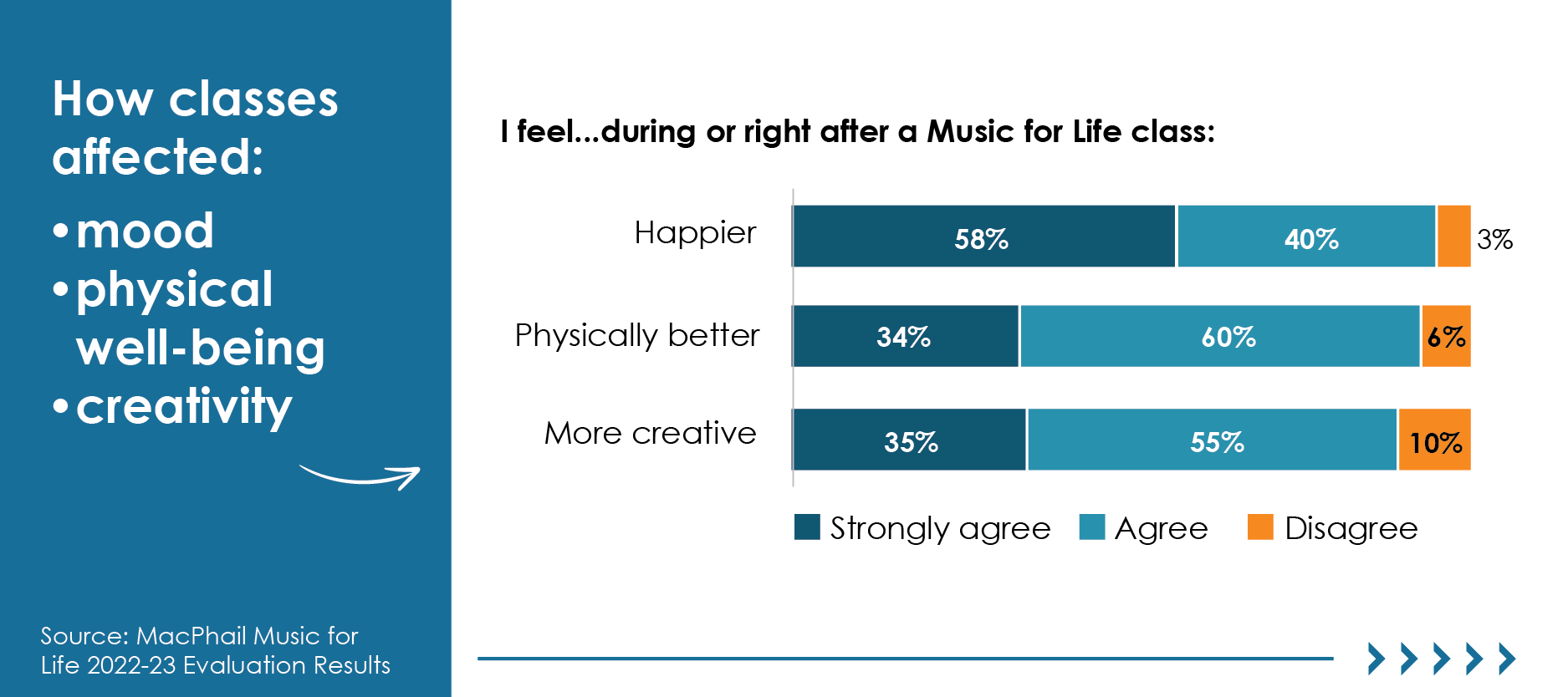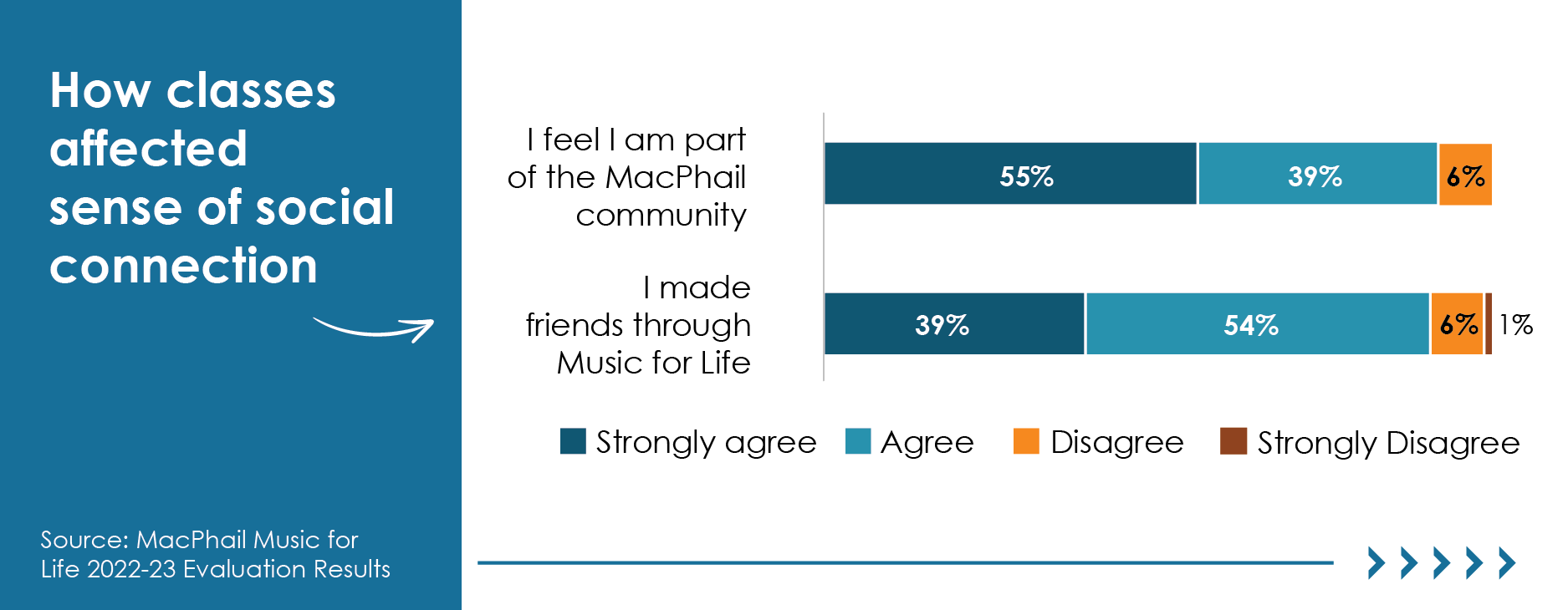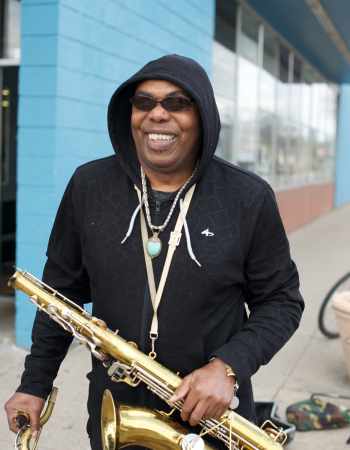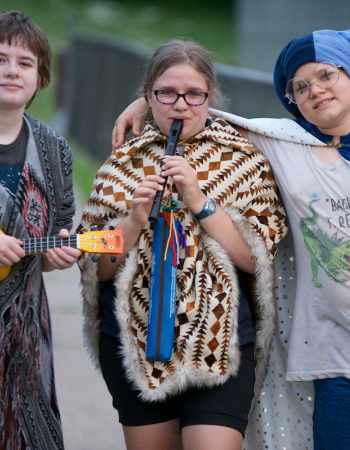
Music for Life Connects Older Adults with Music and Community
Since 2005, MacPhail Center for Music has offered its Music For Life program. Music For Life provides opportunities for older adults to learn and practice music skills and socialize with other adults who are interested in music.
The program does this through a series of music classes, lessons, and ensembles specially designed for older adults. For example, MacPhail’s Giving Voice Chorus is part of a national network of choruses comprised of people living with dementia and their caregivers.
Participant experiences - in their own voices
Wilder has served as MacPhail’s evaluation partner since 2015. In 2023, our Music For Life evaluation included something new: interviews with participants about the impact that Music For Life has had on their lives.
Three interviewees graciously allowed us to share bits of their interview as expressions of Music For Life’s impact. Listen and read about their experiences below.
Voices of Experience Choir ensemble participant on the impact of meeting people in the choir
"For me Voices of Experiences – I went for the music, but it’s not only the music that’s kept me going. The community of people in that choir – they’re interesting people. They’re people that want to try new things. We share things about what books are you reading now? A concert that you went to or a play that you saw? That whole idea of socialization, but socialization with people who not only share my interests but maybe broaden my interests a little bit. You know, make my life a little bit bigger. That’s one of the things as you get older – it’s so easy for your life to get narrower and narrower and narrower for a variety of reasons. I’ve found it’s not just the music that’s keeping me there. It’s what brought me there, but it’s not the only thing that’s keeping me there."
Unwrapping Music class participant on the impact of learning to listen differently
"I’ve learned to be a more critical listener, digging into how the music is built, how it is put across by the performers. Not just thinking oh what a lovely piece of music. You’re thinking of the time it came from, the composer that’s there, the culture, how the composer is playing with you really to get you to follow the path that the composer wants you to follow. We had a class this morning on sensuality and opera. Things I wouldn’t have listened to before or heard before were things like the way the composer used meter, rhythm, melody, chromaticism vs. diatonic scales, to create characters that stayed within character and to contrast characters. You could hear the conversation below the lyrics in the music. I probably wouldn’t have gotten that without knowing to listen for these certain musical elements."
Giving Voice Chorus ensemble participant on the impact of singing with a loved one living with dementia
"My wife was already in assisted living. We weren’t living together. She moved in in April 2014. This was something that we could do together. There was already a love of music. We sang together. We would sing our kids to sleep. I’d play the guitar and my wife would sing. I would pick her up every week and we would go to the rehearsal and it was really, really important. They [MacPhail] had learning tracks that they would produce. They did this right from the beginning – they were really thoughtful about the things they put together to make it work. They had learning tracks – one for the men, and one for the sopranos and one for the altos. I would sing along with the soprano part with my wife in the car when we were driving. It made a world of difference. It’s an uplifting time.
"When I am singing I’m feeling good, so whatever outlets are available to me I’ll take advantage of them. It’s enriching. That’s why I am doing it. There is a rule that you join as couples – it could be the person with a diagnosis and their spouse, or their sibling, or their child. We have all of those connections. There are several of us now who are there as individuals, as singles. Our spouse with a diagnosis is no longer there. One gal would take her mother and her mother passed away, and she still comes. We’re still welcome. There are lots of difficulties along the way, and we hear about that all the time. But we can be supportive of one another – and we are, very much so."
Survey shows participants learned about music, built community, and improved their well-being
Beyond interviews, in 2023 Music For Life participants were also invited to complete the program’s annual feedback survey. The survey results show that many Music for Life participants experienced similar impacts as those described by these three interviewees – that they felt better during or after a Music For Life experience, they felt like they were part of a community, and they learned more about music.
Music For Life participants learned more about music and increased their musical skills
The survey asked Music for Life participants about what they felt they accomplished in music classes they took with MacPhail:
- More than 8 in 10 survey respondents (84%) said they increased their music skills.
- More than 7 in 10 (71%) said they learned more about music.
Music for Life participants felt better in a variety of ways during or right after class

Music For Life participants felt they are a part of a community and made friends through the program

Learn more about Music for Life
Our Music for Life evaluation clearly shows that the program has a meaningful impact for many older adults in our Minnesota music community.
- To learn more about the program and its impact, read the full 2022-23 evaluation report.
- If you’re an older adult who is interested in plugging into MacPhail’s vibrant music community, learn more about Music for Life.
I joined for the music, but it’s not only the music that has kept me going. It’s the community of people in that choir that have kept me going.
Learn more about arts and culture evaluation

Arts and Culture
